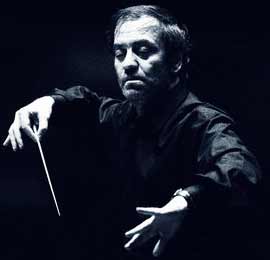Gergiev's Shostakovich at the Kennedy Center
 To hear Tchaikovsky’s First Piano Concerto in concert is either the main draw to attend (perhaps for more than half the audience) or the bane to be endured for much of the rest (critics included) who are there to await – in the case of the Kirov’s Wednesday concert – a Shostakovich Eleventh Symphony.
To hear Tchaikovsky’s First Piano Concerto in concert is either the main draw to attend (perhaps for more than half the audience) or the bane to be endured for much of the rest (critics included) who are there to await – in the case of the Kirov’s Wednesday concert – a Shostakovich Eleventh Symphony.Alexander Toradze’s performance under Valery Gergiev’s baton was the third Tchaikovsky First reviewed on Ionarts this season alone and I am confident that I missed a couple additional performances in the region. If Toradze’s wasn’t the best performance, it was certainly the most personal. Experience and confidence go a long way in avoiding the show-off pitfalls that this concerto seems to lure less seasoned performers into. The opening chords, a little softer than the usual deafening banging, left room for Toradze to swell to a ff later. Pointed ritardandos and moments of genuine subtlety made the first movement rich enough to have your ears avoid the danger of turning on their own autopilot. Eschewing note perfection also kept the senses pleasantly alert.
Robert Battey, Gergiev and His Fresh Young Kirov (Washington Post, October 27) |
God knows how many times the Kirov Orchestra musicians must play “Tchaik-1” – but even the most patient Russian soul will eventually overdose on it, no? Wednesday night seemed a case of this. The orchestra came across as playing with unenthused routine but still with a hint of the typical Russian orchestral sound which can turn out edge-of-the-seat quality in impassioned performances but only sloppy in anything else.
The second movement rolled out to unusual, unnecessary length; again trading the expected for the peculiar, but now no longer in a way that could be called refreshing. The result depended much on the listener’s own preferences. But it is perhaps the reason behind the concert’s success that the third movement can rouse any audience into standing ovations, no matter the performance.
The Shostakovich 11th – last heard at the Kennedy Center in an excellent concert with the NSO under Slatkin – is one of the DSCH symphonies (with the 5th and the 7th) that can wrestle itself into the listeners appreciation by its brute force alone… that is to say: is more easily appreciated by Shostakovich neophytes than the gloomy 8th or the quirky 6th or the later vocal or choral symphonies.
 DSCH, Sy. #4, Jansons / BRSO EMI Review on Ionarts      DSCH, Sy. #4, Gergiev / Kirov Philips Review on Ionarts     |
Gergiev, who is also brilliant at making an orchestra blaze and spit with fire, is a master of this buildup. Take for example his recording of the DSCH 4th: it takes him about half an hour to awaken the stone giant inside the work to life… and then he is unstoppable. Almost too much of a good thing. Under Gergiev, who conducted with what seemed to be a toothpick and his nose in the score, the drums can call the lower strings into action – and they respond with a deliciously frightening, mechanic vigor. They then call the upper strings into action and before long, section by section, the entire orchestra responds. Here are cells of music lined up next to each other, each feeding on another – but without pretense of any long lines and with pregnant pauses inserted. Perhaps this is why Gergiev’s Shostakovich is short on lyricism (something Jansons does well) but rhythmically driving like few others. Perhaps this is why his Shostakovich dare calls Bruckner – of all composers – to mind. It was certainly why the performance at the Kennedy Center was so impressive all the way to the almost abrupt finale sneaking up on the listener.
The Kirov Orchestra was presented by the Washington Performing Arts Society.






















































